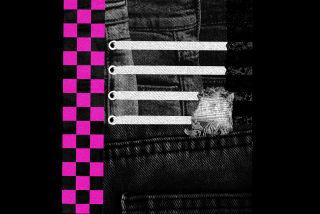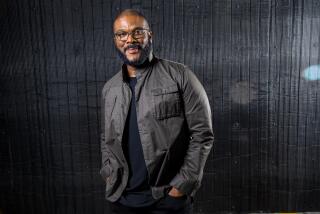Officials call for boycott of ‘N-word’
- Share via
Comic Paul Mooney used to joke in his routine that he uttered the “N-word” 100 times every morning.
“Well, white folks, you shouldn’t have ever made up the word,” Mooney, who is black, says in promotional material. “... I say nigga 100 times every morning; it makes my teeth white.”
But on Monday, Mooney pledged never to use the word again after seeing a video of white comedian Michael Richards, who used the word -- and other slurs -- to denounce hecklers at a recent performance captured on video.
“I’ve used it and abused it, and I never thought I’d say this,” Mooney said, but Richards “is my Dr. Phil -- he’s cured me.”
Mooney, whose career credits include writing for the late Richard Pryor and the TV show “In Living Color,” joined Monday with African American leaders including the Rev. Jesse Jackson and Rep. Maxine Waters (D-Los Angeles) in calling for rap stars, hip-hop artists and everyone else to stop using the offensive word. They endorsed an NAACP campaign to “just say ‘no’ to the N-word.”
“We’re not trying to penalize anyone,” Waters said at a news conference at the Los Angeles Sentinel newspaper, “but don’t use the N-word, no matter who you are, whether you’re black, white, young or old.”
Jackson added: “This word is a symbol of degradation and the actions that flow from it.”
Young people and nonnative English speakers hear the songs and raps and don’t recognize how offensive the word is to some, the African American leaders contend.
It isn’t clear whether rappers and hip-hop artists -- many of whom are African American -- will comply. Several musicians and their agents couldn’t be reached for comment.
Some who have studied its usage argue that banning the word -- used more than 200 times in “The Adventures of Huckleberry Finn,” for example -- goes too far.
The term was originally “simply a dialectal variant of Negro,” according to Webster’s New World College Dictionary, and now “is acceptable only in black English.... It is now generally taboo because of the legacy of racial hatred that underlies the history of its use among whites and its continuing use among a minority of speakers as a viciously hostile epithet.”
But in the way that some other derogatory words have been embraced by the groups they once derided, the word has become almost a term of endearment or empowerment when used among individuals in certain contexts, says Harvard law professor Randall Kennedy, who is African American and wrote the book “Nigger: The Strange Career of a Troublesome Word.”
“I don’t use it,” Kennedy said in a telephone interview Monday. “But some rappers say they use ‘nigga,’ not ‘nigger,’ and say, ‘We want to use it the way we want to use it ... for our purposes, as a gesture of solidarity.’
“They’ve grabbed the word, flipped it around and did their own thing with it,” he said.
Richards, who has apologized and appeared on Jackson’s radio show over the weekend, clearly wasn’t using the word as part of any comedy routine. The comic -- who played the eccentric Kramer on the “Seinfeld” television series from 1989 to 1998 -- has blamed anger rather than racism for his tirade earlier this month at the Laugh Factory in West Hollywood, which was captured on video and posted on TMZ.com.
After hecklers shouted that he wasn’t funny, Richards made references to lynching and uttered vulgarities. He then said, “Throw his a -- out. He’s a nigger,” repeating the word over and over.
Joe Hicks, vice president of the civil rights organization Community Advocates Inc., called the move to ban the word “just silly and outrageous.” Outside the stray white bigot, the N-word is pervasive only in black communities and among hip-hop and rap artists, “not in the business world, not in the American court system, not in the government.”
Hicks, an African American and former director of the Los Angeles Human Relations Commission, said Waters and others shouldn’t be trying to alter the course of contemporary urban culture and accused them of “racial opportunism.”
“Here’s this guy [Richards], who’s been nearly out of work with virtually no career to speak of, who’s hand-grenaded his career in front of the whole world ... and he’s supposed to be some sort of barometer for race relations? It’s the ultimate absurdity,” Hicks said.
Kennedy said that though the movement to end the use of the word is “well-intentioned,” one would never hear the most dangerous and reactionary racists use the word.
“There is something troublesome going on,” Kennedy said, “when this amount of energy is targeted toward people and a phenomenon that in the overall scheme of things is probably marginal.”
Ironically, the publicity over Richards’ tirade may help spur sales of “Seinfeld: Season 7” on DVD, which Jackson encouraged holiday shoppers to refrain from buying.
After less than a week on the market, it had zoomed to the 11th most popular DVD selling on Amazon.com.
Tom Adams, president of Adams Media Research, said it may have reminded shoppers that the DVD is now out. “Like they say in the entertainment industry, any ink is good ink.”
*
Times staff writers Tina Daunt and Chris Lee contributed to this report.
More to Read
Sign up for Essential California
The most important California stories and recommendations in your inbox every morning.
You may occasionally receive promotional content from the Los Angeles Times.










